
Empowering Sierra Leone’s Communities Through Sustainable Agriculture
Sierra Leone, like many developing nations, faces challenges in food security, unemployment, and economic instability, largely due to subsistence farming methods. This initiative seeks to introduce mechanized farming to enhance agricultural productivity, create jobs, and promote self-reliance among local communities.
Objectives
Improve agricultural output through mechanization.
Reduce food insecurity and reliance on food imports.
Create employment and economic opportunities in rural areas.
Provide training in modern agriculture, financial literacy, and entrepreneurship.
Develop cooperative farming models for shared ownership of equipment and resources.
Key Components of the Initiative
A. Capacity Building & Training
Technical Training: Educate local farmers on mechanized farming, irrigation, pest control, and sustainable agriculture.
Entrepreneurship & Financial Literacy: Provide training on business management, cooperative farming, and access to credit.
Provision of Mechanized Farming Equipment
Partner with agricultural equipment suppliers to provide tractors, harvesters, irrigation systems, and storage units.
Establish community-based equipment rental centers to allow multiple farmers to access machinery affordably.
Train local technicians to maintain and repair farming equipment, creating additional employment.
Establishing Cooperative Farming & Value Chains
Organize farmers into cooperatives to share costs, labor, and profits.
Build processing and storage facilities to minimize post-harvest losses and increase market value.
Develop direct trade links between farmers and local/international markets.

